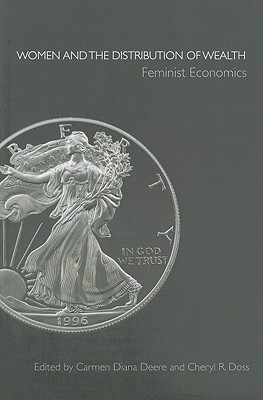

 Routledge
Routledge
Women and the Distribution of Wealth: Feminist Economics


Key Metrics
- Carmen Diana Deere
- Routledge
- Paperback
- 9780415420051
- 9.15 X 6.34 X 0.93 inches
- 1.06 pounds
- Social Science > Women's Studies
- English
 Secure Transaction
Secure TransactionBook Description
Gender is rarely taken into account in analyses of the distribution of wealth, and the evidence on women's ownership of wealth is surprisingly scarce. It is important to examine the distribution of wealth by gender because gender is one important dimension along which inequality exists. In addition, women and men may use their wealth, and the income that it generates, differently and this may have consequences for household well-being and the larger society. Wealth also is related to power - both economic and political power - and asset ownership is related to increased empowerment and well-being.
This collection focuses on documenting the gender distribution of wealth and addressing how and why it matters within a variety of geographical contexts. Including historical, comparative, analytical, and policy-oriented work, the essays:
- conceptualize how we think about and measure asset ownership
- analyze wealth as a measure of bargaining power within households
- examine different marital regimes and their implications for the dynamic of wealth accumulation
- take into account differences of race, ethnicity, and social class
- consider the role of the state in reducing inequalities in wealth and assets by gender and class.
This book was previously published as a special issue of Feminist Economics.
Author Bio
Dr. Carmen Diana Deere is Distinguished Professor Emerita of Latin American Studies and Food & Resource Economics. Since 2015, she is Honorary Professor Emerita of the Latin American Faculty of Social Science (FLACSO-Ecuador) in Quito where she is teaching periodically.
Deere holds a Ph.D. in Agricultural Economics from the University of California, Berkeley, and a M.A. in Development Studies from The Fletcher School of Law and Diplomacy. She was Director of the UF Center for Latin American Studies from 2004 to 2009. Before coming to UF, she was Professor of Economics at the University of Massachusetts, Amherst, where she was Director of the Center for Latin American, Caribbean and Latino Studies.
She is a Past President of the Latin American Studies Association (LASA) and of the New England Council of Latin American Studies (NECLAS). She is an Associate Editor of the journal Feminist Economics, and serves or has served on numerous editorial boards, including the Journal of Agrarian Change, Latin American Perspectives, World Development, Development and Change, and the Latin American Research Review, among other journals.
The author of numerous books and journal articles, her co-authored book with Magdalena León, Empowering Women: Land and Property Rights in Latin America (University of Pittsburgh Press, 2001) was awarded LASA’s Bryce Wood Book Award as well as two other book prizes. She and León were also awarded the James A. Robertson Prize by the Conference on Latin American History for “Liberalism and Married Women’s Property Rights,” considered the best article published in the Hispanic American Historical Review in 2005. Deere has co-edited two special issues of Feminist Economics, on Women and the Distribution of Wealth (2006) and Gender and International Migration (2012). She also co-edited Rural Social Movements in Latin America: Organizing for Sustainable Livelihoods (University Press of Florida, 2009).
From 2009 to 2015, Deere was co-PI of the Gender Asset Gap project, a comparative study of Ecuador, Ghana and India. She coordinated the Ecuador study, and in collaboration with FLACSO-Ecuador, carried out a nationally-representative household asset survey there in 2010. This research endeavor was funded by grants from the Dutch Foreign Ministry’s MDG3 Fund, the Vanguard Foundation, the UN Foundation, and UN Women. (For publications from this project see: https://sites.google.com/view/genderassetgap)
Deere is currently participating in the International Panel on Social Progress (IPSP), convened by Amartya Sen, and will serve as a lead author for the chapter on “The Pluralization of Families and Intimate Relations.” Besides continuing to carry out research in Ecuador, she will also be carrying out research in Cuba as part of the UF-University of Havana collaborative project on The Agricultural Sector and the International Economy: Challenges and Opportunities for Cuba and the United States.
Source: University of Florida
Videos
No Videos
Community reviews
Write a ReviewNo Community reviews